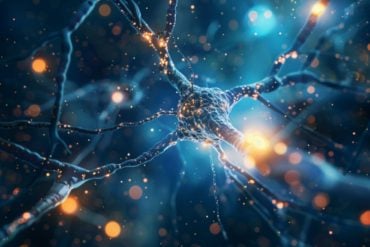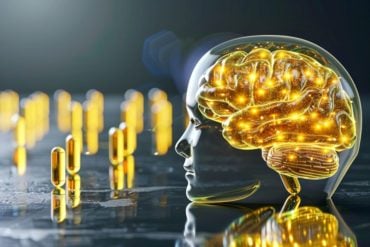Summary: Insomnia disorder, especially in middle-aged to elderly people, is associated with a reduction in cognitive performance and memory.
Source: Concordia University
Chronic insomnia disorder, which affects approximately 10 percent of adults, has a direct negative impact on cognitive function of people aged 45 and over, independent of the effect of other health issues.
This is the primary finding from an analysis of sleep data from the pan-Canadian cohort of the Canadian Longitudinal Study on Aging.
The analysis was conducted by a research team that included postdoctoral researcher Nathan Cross and his advisor Thanh Dang-Vu, both of whom are affiliated with Concordia University’s PERFORM Centre and the Centre de recherche of the Institut Universitaire de gériatrie de Montréal (CRIUGM) of the CIUSSS du Centre-Sud-de-l’Île-de-Montréal. Dang-Vu is also an associate professor in the Department of Health, Kinesiology and Applied Physiology and the Concordia University Research Chair in Sleep, Neuroimaging and Cognitive Health and a clinical associate professor in the Department of Neuroscience at Université de Montréal.
“A number of studies have shown links between insomnia and cognitive problems,” explains Dang-Vu. “However, many of these studies were conducted on a limited number of individuals suffering from insomnia, and the results are not always consistent from study to study. Other studies do not distinguish between chronic insomnia disorder and the simple presence of symptoms. Chronic insomnia is often associated with other health issues (such as anxiety or chronic pain) that can also affect cognitive function, which makes it difficult to determine the direct contribution of insomnia to these cognitive problems. The purpose of our study was, therefore, to determine the precise link between chronic insomnia and cognitive function in a large sample of middle-aged and elderly people while also accounting for the possible effect of these other health issues.”
Nearly 30,000 participants involved
The analysis examined data from 28,485 participants aged 45 and over who come from many cities across Canada, including Montreal. Each participant belonged to one of three groups: (1) people with chronic insomnia disorder, (2) people with symptoms of insomnia who did not complain of any impact on their daytime functioning, and (3) people with normal sleep quality.
They all filled out questionnaires and underwent physical exams and a battery of neuropsychological tests to evaluate different cognitive functions and the quality of their sleep.
Link between chronic insomnia and cognitive problems
“The individuals in the chronic insomnia group performed significantly worse on the tests compared to those from the other two groups. The main type of memory affected was declarative memory – the memory of items and events. This was the case even after accounting for other factors, be they clinical, demographic or lifestyle characteristics, which may influence cognitive performance,” Dang-Vu says.

Further research in this area will aim to better characterize this relationship between poor sleep and cognitive problems.
“Does chronic insomnia predispose people to cognitive decline?” asks Dang-Vu. “Can these cognitive deficits be reversed with sleep disorder treatment? There are many important questions that remain to be explored and that will have a major impact on the prevention and treatment of age-related cognitive disorders.”
Chronic insomnia is one of the most common sleep disorders. This condition is characterized by trouble falling asleep or staying asleep at least three nights a week for over three months with an impact on daytime functioning (mood, attention, and daytime concentration). These symptoms are what separate chronic insomnia disorder from the simple presence of insomnia symptoms (which do not have an apparent impact on daytime functioning).
Source:
Concordia University
Media Contacts:
Patrick Lejtenyi – Concordia University
Image Source:
The image is in the public domain.
Original Research: Closed access
“Association between insomnia disorder and cognitive function in middle-aged and older adults: a cross-sectional analysis of the Canadian Longitudinal Study on Aging”. Nathan E Cross, Julie Carrier, Ronald B Postuma, Nadia Gosselin, Lisa Kakinami, Cynthia Thompson, Florian Chouchou, Thien Thanh Dang-Vus.
Sleep. doi:10.1093/sleep/zsz1143
Abstract
Association between insomnia disorder and cognitive function in middle-aged and older adults: a cross-sectional analysis of the Canadian Longitudinal Study on Aging
Objectives
This study examined the differences in cognitive function between middle-aged and older adults with insomnia disorder, insomnia symptoms only or no insomnia symptoms, in the context of other health and lifestyle factors.
Methods
28,485 participants >45 years completed questionnaires, physical examinations, and neuropsychological testing across domains of processing speed, memory and executive functions. An 8-question instrument assessed participants’ sleep, defining subjects with insomnia symptoms, probable insomnia disorder or no insomnia symptoms. The associations between these three groups and cognitive performance were examined with linear regression models adjusted for lifestyle and clinical factors.
Results
Probable insomnia disorder was identified in 1,068 participants (3.7% of the sample) while 7,813 (27.5%) experienced insomnia symptoms only. Participants with probable insomnia disorder exhibited greater proportions of adverse medical and lifestyle features such as anxiety, depression, and diabetes than both other groups. Analyses adjusting for age, sex, education, as well as medical and lifestyle factors demonstrated that adults with probable insomnia disorder exhibited declarative memory deficits (Rey Auditory Verbal Learning Test) compared to insomnia symptoms only or no insomnia symptoms. Adults with insomnia symptoms exhibited better performance on a task of mental flexibility than both other groups.
Conclusions
These findings suggest that insomnia disorder in middle-aged and older adults is associated with poorer health outcomes and worse memory performance than adults with insomnia symptoms alone or without any sleep complaints, even after adjustment for comorbidities. The assessment of longitudinal data within this cohort will be critical to understand if insomnia disorder may increase the risk of further cognitive decline.







